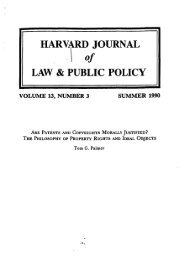G. A. Cohen on Self-Ownership, Property, and ... - Tom G. Palmer
G. A. Cohen on Self-Ownership, Property, and ... - Tom G. Palmer
G. A. Cohen on Self-Ownership, Property, and ... - Tom G. Palmer
You also want an ePaper? Increase the reach of your titles
YUMPU automatically turns print PDFs into web optimized ePapers that Google loves.
3238 Critical Review VoL 12, No. 3quires close scrutiny.’’ I shall set to the side questi<strong>on</strong>s about whether<str<strong>on</strong>g>Cohen</str<strong>on</strong>g> has fairly characterized Nozick’s proviso as c<strong>on</strong>stituting hisprinciple of appropriati<strong>on</strong>: <strong>and</strong> will merely reproduce the c<strong>on</strong>clusi<strong>on</strong>of his treatment, as prolegomen<strong>on</strong> to his central argument that“self-ownership” can be so c<strong>on</strong>strued or integrated with otherarrangements as to necessitate completely equal distributi<strong>on</strong> of wealth<strong>and</strong>income. .<str<strong>on</strong>g>Cohen</str<strong>on</strong>g> (1995,90) insists that any appropriati<strong>on</strong> will make some<strong>on</strong>eworse off,for no other reas<strong>on</strong> than that some<strong>on</strong>e will no l<strong>on</strong>ger beable to appropriate the now-appropriated item: “It is clear bey<strong>on</strong>ddoubt that an appropriati<strong>on</strong> of private property can c<strong>on</strong>tradict an individual’swill just as much as levying a tax <strong>on</strong> him can.” If c<strong>on</strong>tradicting<strong>on</strong>e’s will is the criteri<strong>on</strong> for a theory that is supposed to bebased <strong>on</strong> liberty, then, according to <str<strong>on</strong>g>Cohen</str<strong>on</strong>g>, no private appropriati<strong>on</strong>could meet the requirements of a suitably formulated Nozickian proviso,for, even if a latecomer finding no unappropriated resources lefrto appropriate were to be compensated by greater material wealth,this compensati<strong>on</strong> could not undo the fact that the latecomer’s willhas been overruled. As <str<strong>on</strong>g>Cohen</str<strong>on</strong>g> (ibid., 89) argues, “Nozick disallowsobjectively paternalist use of people’s private property. But he permitsobjectively paternalist treatment of people in ocher ways. For, sincehe permits appropriati<strong>on</strong>s that satisfy nothing but his proviso, he allowsA to appropriate against B’s will when B benefits as a result, or,rather, as l<strong>on</strong>g as B does not lose.” If some<strong>on</strong>e were to chop off myarm, even if he later made me better off, we would still say that myrights had been violated.In the process of making this move, allegedly showing that Nozick’sapproach cannot justifi appropriati<strong>on</strong> by individuals (or groups)&om an unowned comm<strong>on</strong>s, <str<strong>on</strong>g>Cohen</str<strong>on</strong>g> suggests that Nozick‘s baselineof comparis<strong>on</strong>-what <strong>on</strong>e could get in a c<strong>on</strong>diti<strong>on</strong> of no appropriati<strong>on</strong>or ownership at all-is arbitrary, <strong>and</strong> that a variety of collectiveownership arrangements should be c<strong>on</strong>sidered as c<strong>and</strong>idates for thebaseline, as well.6 There are, according to <str<strong>on</strong>g>Cohen</str<strong>on</strong>g> (1995, 78), “otherintuitively relevant counterfactuals, <strong>and</strong> . . . they show that Nozick’sproviso is too lax, that he has arbitrarily narrowed the class of alternativeswith which we are to compare what happens when an appropriati<strong>on</strong>occurs with a view to determining whether any<strong>on</strong>e. is harmedby it.” The alternative rhat he singles out as “intuitively relevant” isthat ofjoint ownership, according to which a resource











